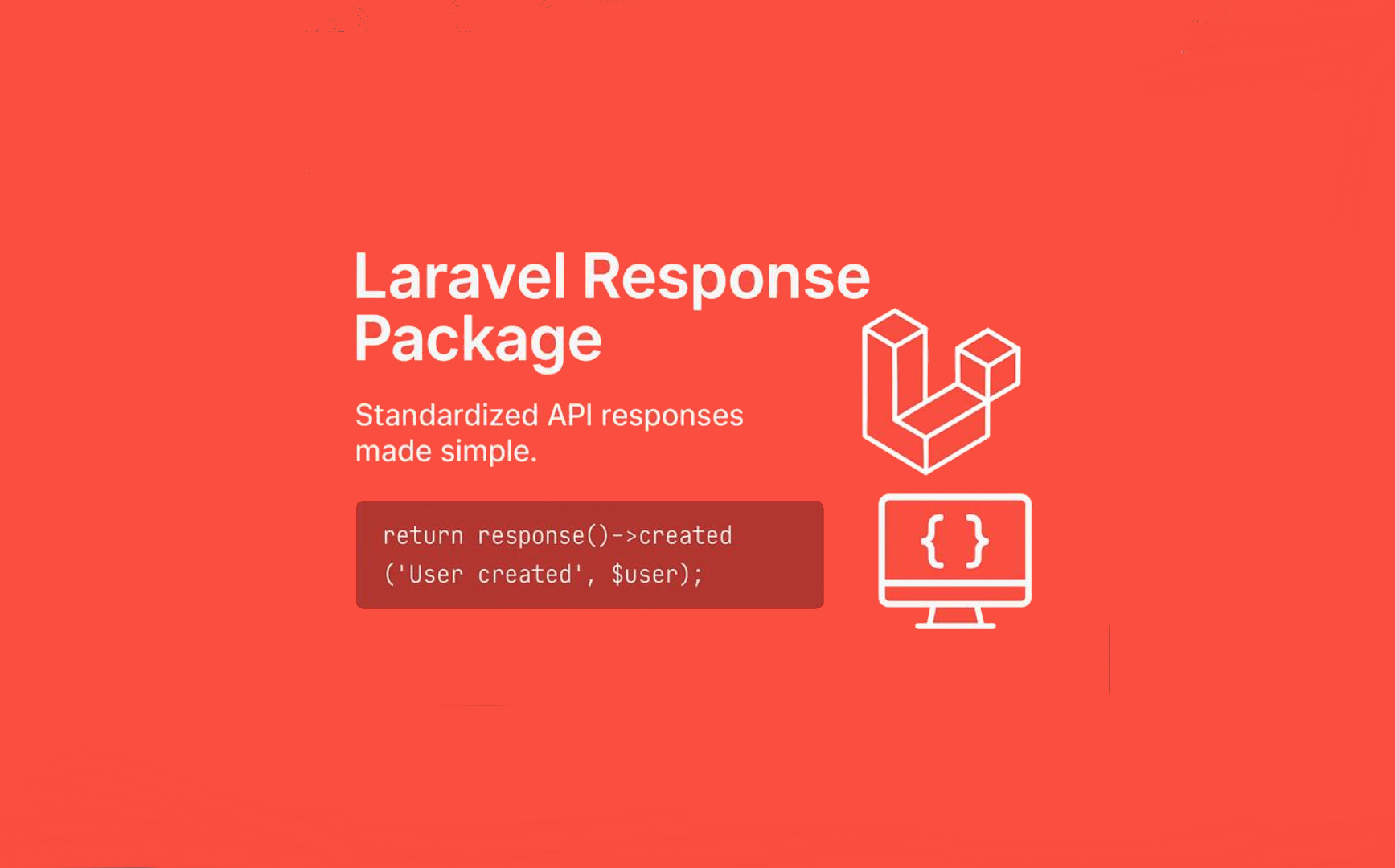
Laravel API Response Formatting Made Simple with This Package
APIs are the backbone of modern web and mobile applications. Whether you're building a small Laravel backend or scaling an enterprise API, consistent and well-structured responses help developers work faster and users get more predictable experiences.
In this guide, we'll show you how to create clean and consistent API responses using a powerful Laravel package: arpanpatoliya/response. We'll also answer common developer questions and use related keywords like "Laravel JSON response", "Laravel API response format", and "custom Laravel API response helper" throughout for better SEO and natural readability.
Why Are Consistent API Responses Important?
When building APIs with Laravel developers often return JSON using:
return response()->json([...]);
While this works, doing it repeatedly for every controller and customizing every status code or error message manually becomes tiring and inconsistent.
Using a response helper or formatting improves:
- Code reusability
- Team collaboration
- API client integration
- Debugging and error tracking
A Laravel API response helper package can save hours of boilerplate coding and ensure all your endpoints follow the same structure.
What Is the Laravel Response Package?
The arpanpatoliya/response package is a Laravel package that helps developers return consistent JSON responses for every type of API request—success, errors, validation failures, paginated data, or custom formats.
Instead of writing the same structure manually, you use methods like:
return response()->success('Operation successful', $data);
return response()->notFound('User not found');
return response()->validationFailure($validator);
This package supports over 75 HTTP status codes and provides ready-to-use response macros.
Key Features of the Laravel Response Helper
This package offers:
- Full HTTP status code coverage (1xx to 5xx)
- Standardized JSON format for all responses
- Custom error handling
- Built-in validation error support
- Paginated and metadata response support
- Lightweight and well-documented
- Easy integration with Laravel 8+
Whether you’re building APIs for mobile apps, SaaS products, or microservices, this package helps streamline response handling.
How to Install the Package?
You can install the Laravel Response Package via Composer:
composer require arpanpatoliya/response
Laravel will auto-discover the package, so there’s no need for manual configuration.
How to Use the Laravel Response Macros?
Here are a few common examples:
Success Response:
return response()->success('User created successfully', $user);
Error Response:
return response()->notFound('User not found');
Validation Failure:
return response()->validationFailure($validator);
Paginated Data:
return response()->paginated('Users retrieved', $users, $pagination);
Metadata Example:
return response()->withMeta('Data loaded', $data, ['version' => '1.0']);
These methods replace the need to write response()->json() manually for each use case.
How to Format API Responses in Laravel?
This package returns a clean, standardized structure:
Success Response Format:
{
"status": true,
"message": "Success message",
"data": { }
}
Error Response Format:
{
"status": false,
"message": "Error message",
"errors": { }
}
Paginated Response Format:
{
"status": true,
"message": "Success message",
"data": [],
"pagination": {
"current_page": 1,
"per_page": 10,
"total": 100
}
}
This makes your API responses more predictable and easier for frontend developers or external API consumers to work with.
FAQs – Laravel API Response Helper
Q1: Is this package compatible with Laravel 10?
Yes. The arpanpatoliya/response package works perfectly with Laravel 8+. It uses Laravel’s built-in service provider discovery.
Q2: What makes this different from response()->json()?
This package abstracts the logic for formatting API responses. Instead of repeating the same code, you call helper methods that return properly structured data based on HTTP standards.
Q3: Can I customize the message or status code?
Yes. You can use the custom() method for complete control:
return response()->custom(true, 'Operation completed', $data, 201);
Q4: How can I handle validation errors?
Use Laravel’s validator as usual, and return:
return response()->validationFailure($validator);
Q5: Is it useful for building REST APIs?
Absolutely. The package is ideal for RESTful APIs and JSON:API-like implementations. It ensures uniformity across all routes and makes API response maintenance easier.
Use Case: Laravel User Controller Example
Let’s say you have a UserController. Here’s how your store method might look:
public function store(Request $request)
{
$validator = Validator::make($request->all(), [
'name' => 'required|string|max:255',
'email' => 'required|email|unique:users',
'password' => 'required|min:8'
]);
if ($validator->fails()) {
return response()->validationFailure($validator);
}
try {
$user = User::create($request->all());
return response()->created('User created', $user);
} catch (\Exception $e) {
return response()->serverError('Failed to create user');
}
}
This approach improves code readability and makes it easier to debug or update in the future.
Testing and Reliability
You can run tests using:
composer test
The package comes with PHPUnit test coverage that validates:
- Status codes
- JSON structure
- Validation handling
- Paginated responses
- Edge cases like 204, 429, or 503 errors
It’s a reliable solution ready for production use.
When Should You Use This Laravel Package?
This package is ideal if you:
- Want cleaner code in your Laravel API
- Need consistent API response formatting
- Want to reduce boilerplate logic
- Are working with teams or large codebases
- Are building APIs consumed by frontend apps or third parties
It saves time, improves code quality, and helps developers focus on the core logic instead of formatting.
Final Thoughts
The arpanpatoliya/response package for Laravel is a small but powerful tool that improves the way you handle API responses. It’s especially useful for developers who work with REST APIs, JSON responses, and data-driven applications.
Using this package:
- You write less boilerplate
- Maintain a standard response structure
- Improve developer experience on both backend and frontend
It's a perfect fit for any Laravel-based API project.
Try It in Your Laravel Project
You can start using the package today by running:
composer requires arpanpatoliya/response
For full documentation and examples, visit the GitHub repository.
If you need help setting up your Laravel API, or want a custom backend solution, get in touch with our team at Codeclinic. We specialize in API-first development, Laravel consulting, and scalable backend architecture.
Get A Quote
Reach Out and Bring Your Visions to Life
Get A Quote
Reach Out and Bring Your Visions to Life

